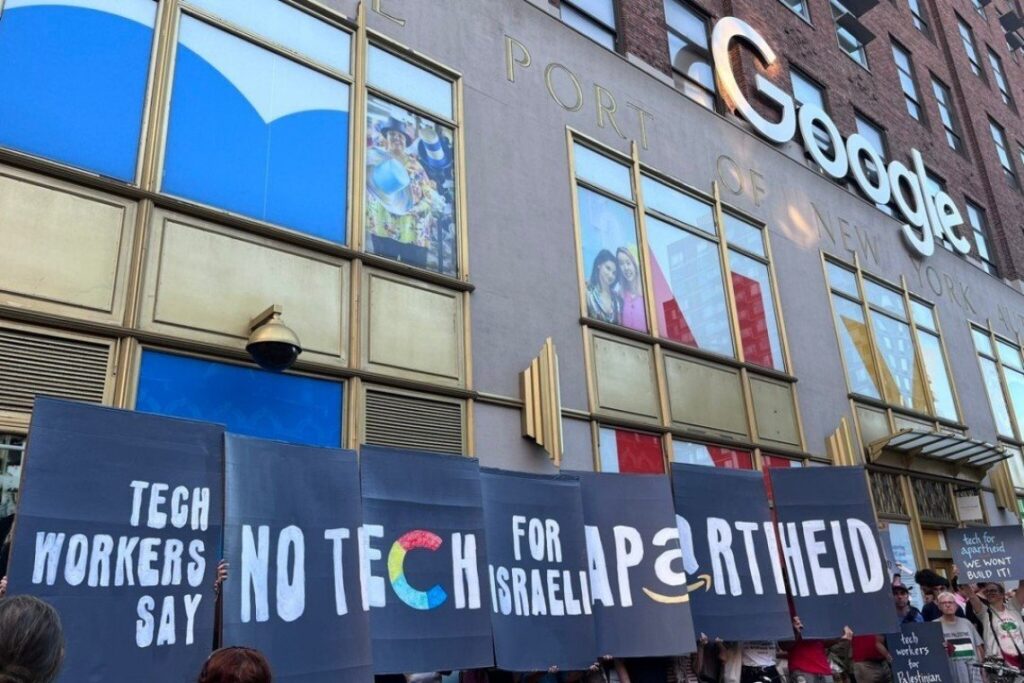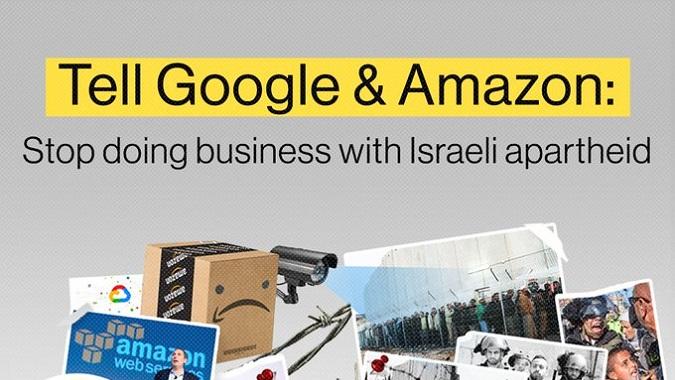In recent years, the protracted Israel-Palestine conflict has garnered significant global attention, resulting in immense human suffering, primarily endured by Palestinians. Amidst this backdrop, the Boycott, Divestment, and Sanctions (BDS) movement has emerged as a means to express solidarity with the Palestinian people and exert pressure on companies and entities supporting Israel.
This article delves into the BDS movement and why there are compelling reasons to boycott tech giants Amazon and Google for their affiliations with Israel.

The BDS Movement and Its Significance
The Palestinian BDS National Committee (BNC), a prominent coalition in Palestinian civil society, leads the global BDS movement. BDS encourages individuals, organizations, and institutions worldwide to engage in boycotts, divestment, and sanctions against Israel as a form of protest against the human rights violations perpetrated by the state against Palestinians.
The Importance of the BDS Movement
The BDS movement seeks to curtail state, corporate, and institutional support for the Israeli regime, which is widely criticized for what is perceived as acts tantamount to genocide in Gaza. Palestinians rely heavily on the BDS movement to combat the complicity of major companies and states in the oppressive policies they face.
Targeted vs. Untargeted Boycott
The Israel-Palestine conflict evokes deep emotions and a sense of helplessness for many. Some are tempted to boycott all products and services associated with Israel, yet the efficacy and genuine impact of such an untargeted boycott are questioned. Therefore, the BDS movement adopts a targeted boycott strategy, inspired by movements like the anti-apartheid struggle in South Africa and other global struggles for justice. It focuses on a carefully selected set of companies and products that play a direct and evident role in Israel’s wrongful actions, where there exists potential for success.
Companies actively supporting human rights violations by Israel, such as Siemens, PUMA, Carrefour, AXA, Hewlett Packard Inc (HP Inc), SodaStream, Ahava, and Israeli products in supermarkets, are all strategically chosen targets for BDS.
Moreover, major technology companies, including Amazon and Google, have entered into billion-dollar contracts with the Israeli government and military to provide cloud technology that supports Israeli apartheid practices. This association has sparked the #NoTechForApartheid campaign, aiming to pressure these tech giants to cease their involvement in the oppression of the Palestinian people.
The Importance of Focus
It is vital to recognize that extensive lists of boycotts, frequently circulated on social media, may prove ineffective. Such lists often include numerous companies with questionable links to the Israeli regime. Therefore, focusing on companies that genuinely contribute to human rights violations in Palestine is essential for achieving tangible results.
Furthermore, efforts by the global community to support companies and institutions that enable Israeli human rights abuses are not only legitimate but also necessary. Thus, boycotting companies that aid the ongoing crisis in Gaza is a justifiable step.
The BDS movement serves as a channel for the global community to express solidarity with the Palestinian people and pressure companies and entities complicit in their oppression by Israel.
Focusing on companies and products genuinely involved in human rights violations in Palestine is the key to achieving substantial outcomes in support of the Palestinian struggle for independence. Hence, the call to boycott Amazon and Google products is a pivotal part of these collective efforts to advocate for positive change in the Israel-Palestine conflict.

The Tech Giants and Their Role in Project Nimbus
The words, “We are anonymous because we fear retaliation,” were part of a letter signed by 500 Google employees last October when they decried their company’s direct support for the Israeli government and military. In their letter, the signatories protested a $1.2 billion contract between Google, Amazon Web Services, and Tel Aviv, which provides cloud services for the Israeli military and government. This contract enables further surveillance and unlawful data collection on Palestinians and facilitates the expansion of Israel’s illegal settlements on Palestinian land. This project is known as Project Nimbus, announced in 2018 and implemented in May 2021, during the first week of the Israeli war on Gaza, which resulted in the loss of many Palestinian lives.
The Google employees were deeply disturbed by their company’s direct involvement in the Israeli occupation of Palestine, but they were equally outraged by the “disturbing pattern of militarization” witnessed through similar contracts agreed upon by Google, Amazon, Microsoft, and other tech giants with the US military, Immigration and Customs Enforcement, and various policing agencies.
In a published article in The Nation, respected US academics revealed the financial incentive behind Amazon’s involvement in such military-linked business, asserting that military contracts have become a significant source of profit for Amazon. It was reported that Amazon Web Services (AWS) alone accounted for 63 percent of Amazon’s profits in 2020.
The moral imperative of putting people before profit cannot be more evident than in the Palestinian context. The Israeli occupation of Palestine has persisted for decades, and multiple UN resolutions have condemned Israel for its occupation, colonial expansion, and violence against Palestinians. If this is not enough to deter Google and Amazon from engaging in projects aimed at securing Israel’s “national security” (which translates to the continued occupation of Palestine), a damning report by Israel’s largest human rights group, B’Tselem, should serve as a wakeup call.
In January, B’Tselem declared Israel an apartheid state, a conclusion supported by the international rights group Human Rights Watch in April. Project Nimbus was announced just weeks before this declaration, raising questions about Google and Amazon’s willingness to support apartheid.
Check Israeli Product List HERE
Facilitating Israeli War Crimes
Google and Amazon’s involvement in Project Nimbus is highly concerning. According to The Nation, the Google-Amazon cloud service will help Israel expand its illegal Jewish-only settlements by “supporting data for the Israel Land Authority, the government agency that manages and allocates state land.” These settlements, repeatedly condemned by the international community, are built on Palestinian land and are directly linked to the ongoing ethnic cleansing of the Palestinian people.
Haaretz, an Israeli newspaper, called Project Nimbus “perhaps the most lucrative tender issued by Israel in recent years.” This project, involving top Israeli army generals vying for a share of the profit, has also attracted interest from other international tech companies. They all seek to be part of Israel’s technology drive, ultimately aimed at keeping Palestinians entrapped, occupied, and oppressed.
This is why the Palestinian boycott movement is of utmost importance. It targets international companies migrating to Israel in pursuit of profits. Israel should be boycotted, not enabled, and sanctioned, not rewarded. Profit generation can be achieved without subjecting an entire population to the injustices of an apartheid regime. Despite Google’s justifications and Amazon’s rationalizations, the fact remains that they are facilitating Israeli war crimes in Palestine.
Recent Employee Retaliation and Corporate Involvement
In recent developments, hundreds of Google workers signed a petition accusing the company of “unjustly retaliating” against one of their colleagues, Ariel Koren, who actively contributed to the October letter decrying Google’s support for Israel. Koren, a product marketing manager at Google for Education with six years of service, is an employee who no longer seemingly aligns with Google’s priorities, as the company becomes increasingly involved in military and security projects.
Koren’s response to Google’s involvement was rooted in a deep sense of moral responsibility: “When you work in a company, you have the right to be accountable and responsible for the way that your labor is actually being used.” In response to her statement, Google presented Koren with an ultimatum: relocate to Brazil or lose her position.
Koren’s case is not an isolated one. This raises concerns about corporate retaliation against employees who take a stand for moral and ethical reasons. In an age marked by militarism, surveillance, unwarranted facial recognition, and censorship, speaking out for human rights and fundamental freedoms is no longer merely an option.
The Unethical Pursuit of Profit
In the past, Amazon faced criticism for denying that some of its workers were forced to urinate in water bottles. The company issued an apology after investigative journalism website The Intercept provided evidence to the contrary. However, Amazon, which stands accused of numerous worker rights violations, including “union-busting,” is unlikely to reverse course, especially when significant profits are at stake.
Yet, profits generated from market monopolies and the mistreatment of workers are different from profits earned through direct contributions to war crimes and crimes against humanity. While human rights violations should be condemned regardless of context, Israel’s ongoing oppression of the Palestinian people, now with the support of these tech giants, remains one of the gravest injustices that continues to stain the collective conscience of humanity.
In summary, no amount of justification from Google or rationalization from Amazon can change the fact that they are facilitating Israeli war crimes in Palestine. The pursuit of profit should never come at the expense of human rights, especially in a context as critical as the Palestinian struggle for justice and equality.

The BDS movement remains a crucial avenue for global solidarity with the Palestinian people and for pressuring companies involved in human rights violations. As global awareness increases, it is essential to make informed choices and harness the power of collective action in support of the Palestinian quest for independence and justice.
The calls to boycott tech giants Amazon and Google serve as a reminder of the ongoing struggle for justice in the Israel-Palestine conflict and the pivotal role that individuals and entities can play in catalyzing change.
- Israeli Product List: What You Need to Boycott
The Palestinian BDS National Committee (BNC), the leading coalition in Palestinian society spearheading the global Boycott, Divestment, and Sanctions (BDS) movement, conveys its appreciation to activists, organizations, and institutions worldwide for their substantial solidarity with the Palestinian cause. Against the backdrop of the ongoing crisis in Gaza, BDS serves as a vital instrument to confront […]
- Top Israeli Food Brands: Which Brands to Boycott
Boycotting Israeli products and companies that endorse Israel stands as a peaceful global tactic to address the ongoing Israeli-Palestinian conflict. Inspired by the successful anti-apartheid boycott in South Africa, this movement seeks to wield economic influence as a force for change. By refraining from Israeli goods, individuals can actively participate in easing Palestinian suffering. Understanding […]
- The Founding Father and The First President of Israel
Emblem of Israel To enrich your insights into presidential figures worldwide, also explore some prominent first presidents from other countries, such as Ireland, Iraq and Iran. Delving into the leadership journeys of these figures can offer valuable perspectives on their historical significance and pivotal roles in shaping global politics. The official residence and symbol of […]

